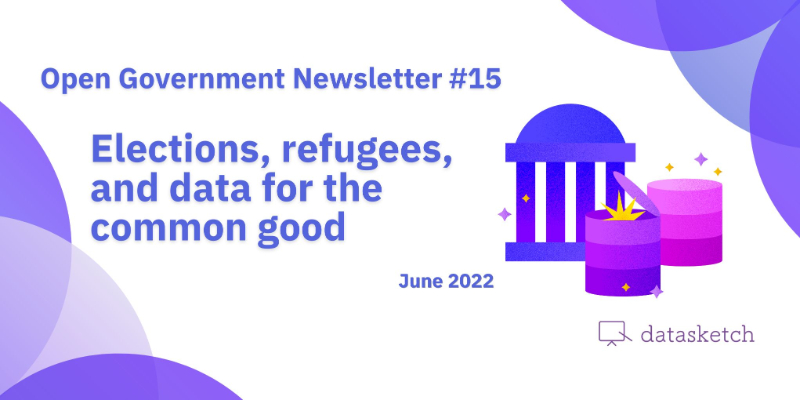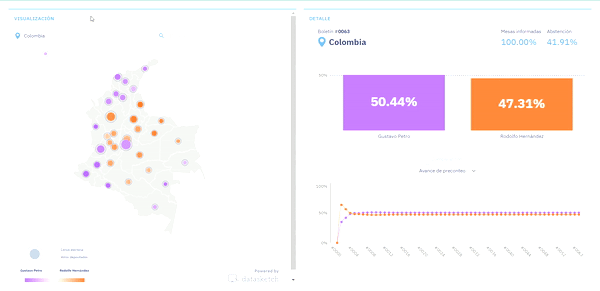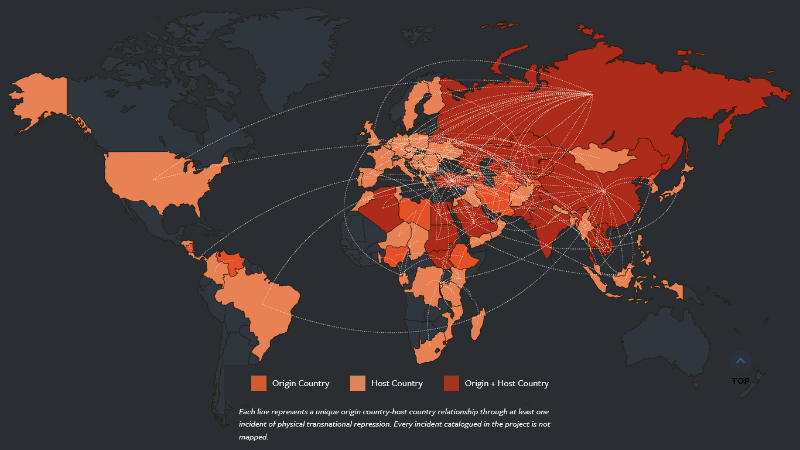Elections, Refugees, and Data for the Common Good - Open Gov #15
In this issue of the newsletter, we think about open government in terms of elections, refugees, and data for the common good.
Available in:

We hope you are having a good week.
We come loaded with news and lots of excitement. But, before we get into it, we would like to ask you to complete this short survey to help us make a better newsletter. We promise you it will take less than 5 minutes.
Elections in Colombia
On June 19, Colombia’s second round of the presidential elections took place. From Datasketch, we created this map for election monitoring, which we hope to replicate in other countries. It is the perfect tool to see the data with context and compare the results with other historical votes at national and territorial levels.
In addition, we participated live as guest analysts in the Election Special of Canal Capital, the public television of Bogotá. We are grateful for this space, as it proposed the data-driven analysis and invited organizations such as Movilizatorio, Pares Colombia, Búho, and Datasketch, recognizing our expertise on the subject. We are sure that Open Government is strengthened with this type of alliance.
Datasketch is part of Colombia’s Civil Society Organizations of the OGP Multi-Stakeholder Forum. In this context, we invite the president-elect, Gustavo Petro, to commit to making Open Government a priority in his government and reaffirm our commitment to the agenda.

Source: Elections 2022 | Datasketch
Defending Democracy in Exile
Freedom House released its report “Defending Democracy in Exile: Understanding and Responding to Transnational Repression”. The document assesses the actions of governments to silence civilians, activists, dissidents, journalists, and human rights defenders outside their borders.
The database of 735 physical cases of transnational repression makes it possible to assess how it affects the fundamental rights of individuals and undermines the rule of law in countries of exile. The collection of this data makes it easier to know which States commit this practice and in what way. It provides tools for public transparency and citizen oversight of these cases.

Source: Defending Democracy in Exile: Understanding and Responding to Transnational Repression | Freedom House
World Refugee Day
June 20 marks World Refugee Day. Beyond the exile of the previous post, we compiled content on data and visualizations on the topic. These resources recognize the potential of data to make policy decisions that achieve inclusion for people.
Responsible Data for Children (RD4C) lays out the reasons for how data serves to provide better services but warns of its risks in the face of possible revictimization. Hence, the importance of responsible data implies expressing knowledge on the part of children and prioritizing their needs.
The Joint Data Center on Forced Displacement (JDC) of the World Bank and UNHCR launched the 2021 report on the quantity, quality, and availability of refugee data. The JDC demonstrates success stories of data use in several countries, including Chad, Burkina Faso, Colombia, and those comprising the Mashreq region.
The New Statesman published a bar chart with the countries hosting the most refugees in 2021, generally in low- or middle-income countries that are contiguous, such as Turkey, Colombia, and Uganda.
Data governance with a social function
Jathan Sadowski developed an article on the political economy of data intermediaries. Its premise is that data has become a manifestation of capital, which intermediaries monopolize throughout the data lifecycle, namely creation, storage, analysis, and use. This dynamic shapes the political economy of data and, ultimately, data governance.
Sadowski recognizes the social value of data, so he proposes large-scale interventions in its governance. Indeed, he suggests public data fiduciaries make them a collectivized public good rather than a commodity and a digital ecosystem of decentralized intermediaries. To realize the above, he underpins several measures for the disintermediation of the digital economy, such as accountability and democratic oversight, to give it legitimacy.
I want to read more!
-
🌎 Open Americas | Open Government Partnership
-
🙈 ‘Mind the Gap’: Sexuality Education in the Digital Era in China | Bot Populi
-
🏙️ World Urban Forum | ONU Habitat
- WUF11: Gender-Sensitive Urban Planning Training | Cities Alliance
-
💡 Diseño para generar valor público ¿Cuál es la importancia del diseño en las políticas públicas de la era digital? (es) | Noticias UAI
-
🇺🇸 3 In 10 Americans Named Political Polarization As A Top Issue Facing The Country | FiveThirtyEight




